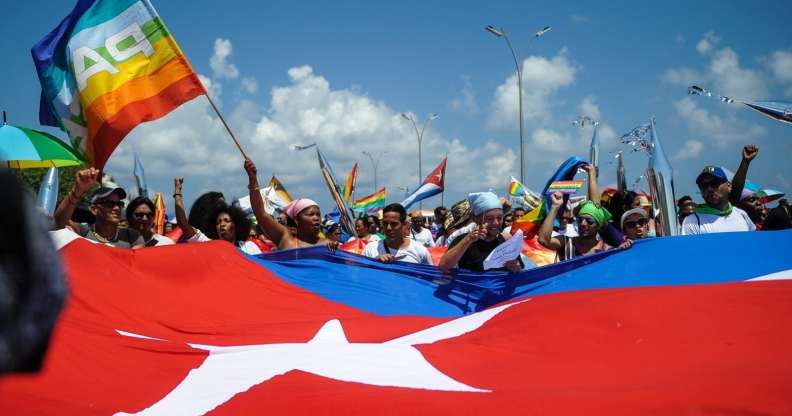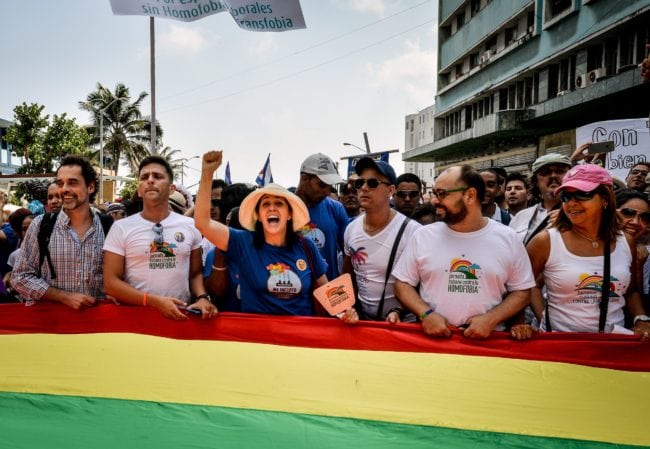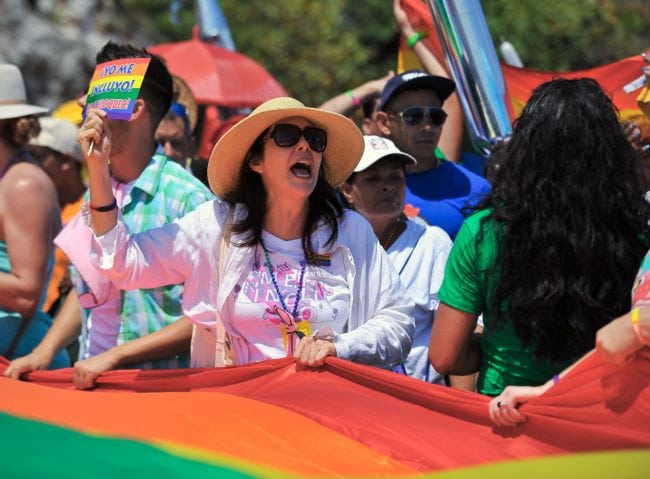Cuba’s new constitution would ‘open door’ to same-sex marriage

LGBT people march against homophobia in Havana. (YAMIL LAGE/AFP/Getty)
Cuba’s new constitution opens the door to same-sex marriage – after behind-the-scenes pressure from LGBT activists.
The Cuban government is currently developing a new constitution as part of a package of reforms intended to modernise the country.
As part of the reforms, proposed by the country’s former President Raúl Castro, the definition of marriage would be left open to same-sex couples.
According to state newspaper Granma, the new constitution would define marriage as a “voluntary and consensual union between two people without distinction of sex”.

A Pride event in Havana (YAMIL LAGE/AFP/Getty)
According to Reuters, the secretary of the council of state Homero Acosta told lawmakers: “The possibility of marriage between two people strengthens our project’s principles of equality and justice.”
It may not allow same-sex weddings to begin immediately upon adoption of the document, but would significantly ease the process for any future legislative or legal advance.
The draft constitution, currently being debated by the National Assembly, would also affirm “the principle of non-discrimination based on sexual orientation and gender identity”.
The changes were pressed for by Raúl Castro’s daughter Mariela Castro, an LGBT activist who holds significant sway in the country as a member of the family who ruled for five decades.
Mariela Castro had told media that she would push for LGBT rights as part of the reforms process – telling reporters that LGBT activists “have the strength” to pursue change, praising new President Miguel Díaz-Canel’s “sensibilities and awareness” on gay issues.

Director of the National Centre for Sexual Education (CENESEX) Mariela Castro (C), shouts slogans during a gay parade, on May 9, 2015, in Havana. (ADALBERTO ROQUE/AFP/Getty)
Homosexuality has been legal in Cuba since 1979, but there are little anti-discrimination protections for LGBT people and no partnership rights for same-sex couples.
Cuba has a troubled history on LGBT rights.
From 1959, President Fidel Castro oversaw a regime that orchestrated the persecution and murder of LGBT people alongside other dissenters.
Homosexuals were viewed as “inherently counter-revolutionary” and homosexuality was declared a “deviation incompatible with the revolution” by Castro’s regime.

Director of the National Centre for Sexual Education (CENESEX) Mariela Castro (YAMIL LAGE/AFP/Getty)
Although acceptance of homosexuality has increased, much of the country’s LGBT movement is centred around Mariela Castro, a figure who still faces enormous scepticism internationally over her high-profile role as a gay rights campaigner.
Former RuPaul’s Drag Race contestant Mimi Imfurst in 2016 became the first American drag queen to perform in Cuba, as relations develop between the two countries.
Taking advantage of the relaxation of US sanctions, drag queen Mimi Imfurst became the first to perform a show in the country, performing on New Years Eve with help from local LGBT groups.
The culture gap was apparent from the start – with the local dancers taking part in the show having never heard Madonna’s ‘Express Yourself’ before.
However, the performers overcame the cultural and language gap for a groundbreaking performance “in hopes that it will inspire American and Cuban relations to continue to improve”.

